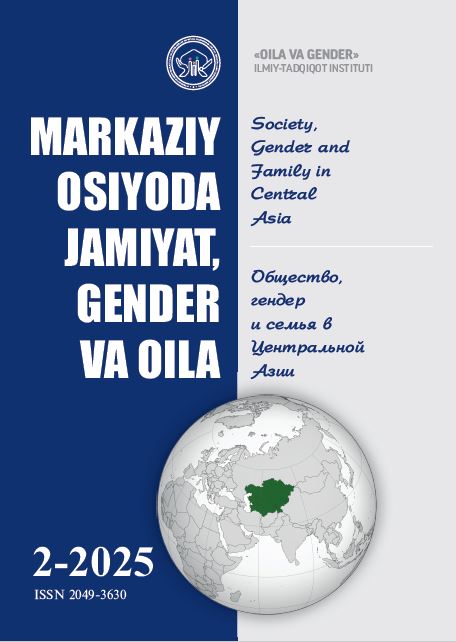Results of a study of the specific features of the development of adolescent mental abilities in families
DOI:
https://doi.org/10.65185/mojgo.vi.241Abstract
This article explores the diverse family-related factors influencing the intellectual development of adolescents, with a focus on the Uzbek context. Drawing upon both local and international studies, it examines the roles of family structure, parenting styles, socioeconomic status, and parental involvement in shaping cognitive outcomes. The findings underscore the significance of a supportive family environment in fostering adolescents’ intellectual growth.
Keywords:
adolescent development family structureReferences
Bates T. C., Lewis G. J., & Weiss A. (2013). Childhood socioeconomic status amplifies genetic effects on adult intelligence. Psychological Science, 24(10). pp. 2111-2116. https://doi.org/10.1177/0956797613488394
Baumrind D. (1991). The influence of parenting style on adolescent competence and substance use. The Journal of Early Adolescence, 11(1). pp. 56-95. https://doi.org/10.1177/0272431691111004
Bialystok E. (2011). Reshaping the mind: The benefits of bilingualism. Canadian Journal of Experimental Psychology, 65(4). pp. 229-235. https://doi.org/10.1037/a0025406
Bronfenbrenner U., & Morris P. A. (2006). The bioecological model of human development. In R. M. Lerner & W. Damon (Eds.), Handbook of child psychology: Theoretical models of human development (Vol. 1, 6th ed.. pp 793-828). John Wiley & Sons Inc.
Bruner J. (1991). The narrative construction of reality. Critical Inquiry, 18(1), 1–21.
Falbo T., & Polit D. F. (1986). Quantitative review of the only child literature: Research evidence and theory development. Psychological Bulletin, 100(2). pp. 176-189. https://doi.org/10.1037/0033-2909.100.2.176
Gentry M., & Benington J. (2021). The role of grandparents in the socialization of grandchildren: A crosscultural analysis. Journal of Intergenerational Relationships, 19(2). pp. 143-165.
Grolnick W. S., & Ryan, R. M. (1989). Parent styles associated with children’s self-regulation and competence in school. Journal of Educational Psychology, 81(2). pp. 143-154. https://doi.org/10.1037/0022-0663.81.2.143
Jeynes W. H. (2007). The relationship between parental involvement and urban secondary school student academic achievement: A meta-analysis. Urban Education, 42(1). pp. 82-110. https://doi.org/10.1177/0042085906293818
King P. E., & Boyatzis, C. J. (2004). Exploring adolescent spiritual and religious development. In R. M. Lerner & L. Steinberg (Eds.), Handbook of adolescent psychology (2nd ed., – P. 529-556). John Wiley & Sons.
Masten A. S. (2014). Global perspectives on resilience in children and youth. Child Development, 85(1).pp. 6-20. https://doi.org/10.1111/cdev.12205
Rideout V., & Robb M. B. (2019). The Common Sense census: Media use by tweens and teens 2019. Common Sense Media. https://www.commonsensemedia.org/research/the-common-sense-census-mediause-by-tweens-and-teens-2019
Turakulova A., Khabibov T., & Sharafutdinova Z. (2022). The question of fathers: Features of raising adolescents in complete and incomplete families in Tashkent (Uzbekistan). Social Sciences. pp. 1-15. https://doi.org/10.1080/03623319.2022.2154447
Turkheimer E., Haley A., Waldron M., D’Onofrio B., & Gottesman I. I. (2003). Socioeconomic status modifies heritability of IQ in young children. Psychological Science, 14(6). pp. 623-628. https://doi.org/10.1046/j.1467-9280.2003.01475.x
UNICEF Uzbekistan. (2020). Youth study shows access to education & employability as key concerns for young people in Uzbekistan. https://www.unicef.org/uzbekistan/en/youth-report-pr
Downloads
Published
How to Cite
License
Copyright (c) 2025 Ummatkulova Nigora Umarqulovna

This work is licensed under a Creative Commons Attribution 4.0 International License.










